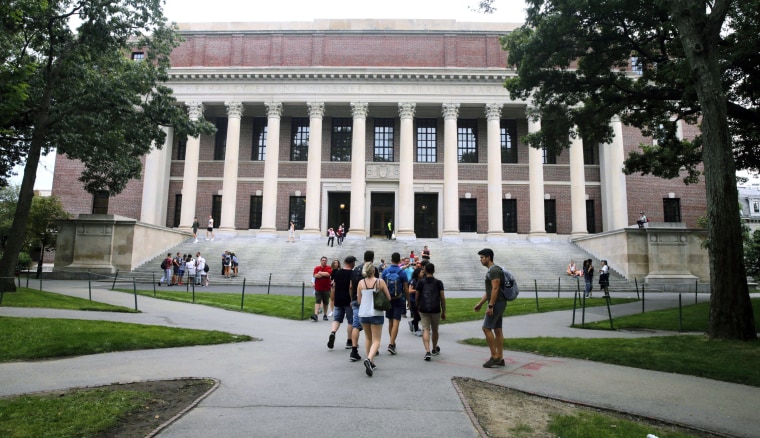With the fate of Harvard’s affirmative action lawsuit in the hands of a judge, a new study stemming from that suit has raised more questions about the role of wealth, race and access in college admissions at prestigious universities.
The study, published earlier this month in the National Bureau of Economic Research, found that 43 percent of white students admitted to Harvard University were recruited athletes, legacy students, children of faculty and staff, or on the dean’s interest list — applicants whose parents or relatives have donated to Harvard.
That number drops dramatically for black, Latino and Asian American students, according to the study, with less than 16 percent each coming from those categories.
The study also found that roughly 75 percent of the white students admitted from those four categories, labeled 'ALDCs' in the study, “would have been rejected if they had been treated as white non-ALDCs,” the study said.
Almost 70 percent of all legacy applicants are white, compared with 40 percent of all applicants who do not fall under those categories, the authors found.
“Removing preferences for athletes and legacies would significantly alter the racial distribution of admitted students, with the share of white admits falling and all other groups rising or remaining unchanged,” the study said.
Harvard’s acceptance rate for its class of 2023 was just 4.5 percent.
The study was written by economists Peter Arcidiacono, Josh Kinsler and Tyler Ransom and looked at data spanning from 2009 to 2014. That data was made available through a lawsuit alleging Harvard intentionally discriminates against Asian American applicants in its undergraduate admissions.
The information provided in that lawsuit also showed how Harvard’s preferences operate for other applicant groups, the study said. The questions the study asked were “motivated by the ongoing public debate related to privilege, fairness, and racial equity in higher education,” the authors wrote.
The study also found that a white applicant who did not fall under any of the privileged categories with a 10 percent chance of admission would see a five-fold increase in the chance of admission if they were a legacy, a more than seven-fold increase if they had relatives who donated to Harvard, and a near certainty of being admitted if they were a recruited athlete.
Harvard did not immediately respond to a request for comment on the study.
In April, Harvard said 25.4 percent of its admitted class of 1,950 students were Asian American, up from 22.7 percent the year before. The new figure was the highest proportion of Asian American students that the university has admitted in the last decade.
In 2017, minorities made up the majority of Harvard's freshman class of 2021 for the first time in its 380-year history, with 50.8 percent of its admitted students.
Closing arguments in the lawsuit against the university ended in February, and the case is now in the hands of U.S. District Judge Allison D. Burroughs, although that impending ruling is expected to be appealed.
Harvard has said race is one of many factors used to consider applicants and it can only help, not hurt, an applicant’s chances. The group behind the lawsuit, Students for Fair Admissions, is led by Edward Blum, a conservative activist who has fought against affirmative action and other laws involving race and ethnicity, such as the Voting Rights Act.
Earlier this year, about 50 people were charged in a sweeping $25 million college entrance exam cheating scheme, which exposed how some affluent parents paid thousands of dollars to boost their children’s chances of going to elite colleges through bribes.
Actress Felicity Huffman pleaded guilty in May in the scandal, while actress Lori Loughlin's case is ongoing.

